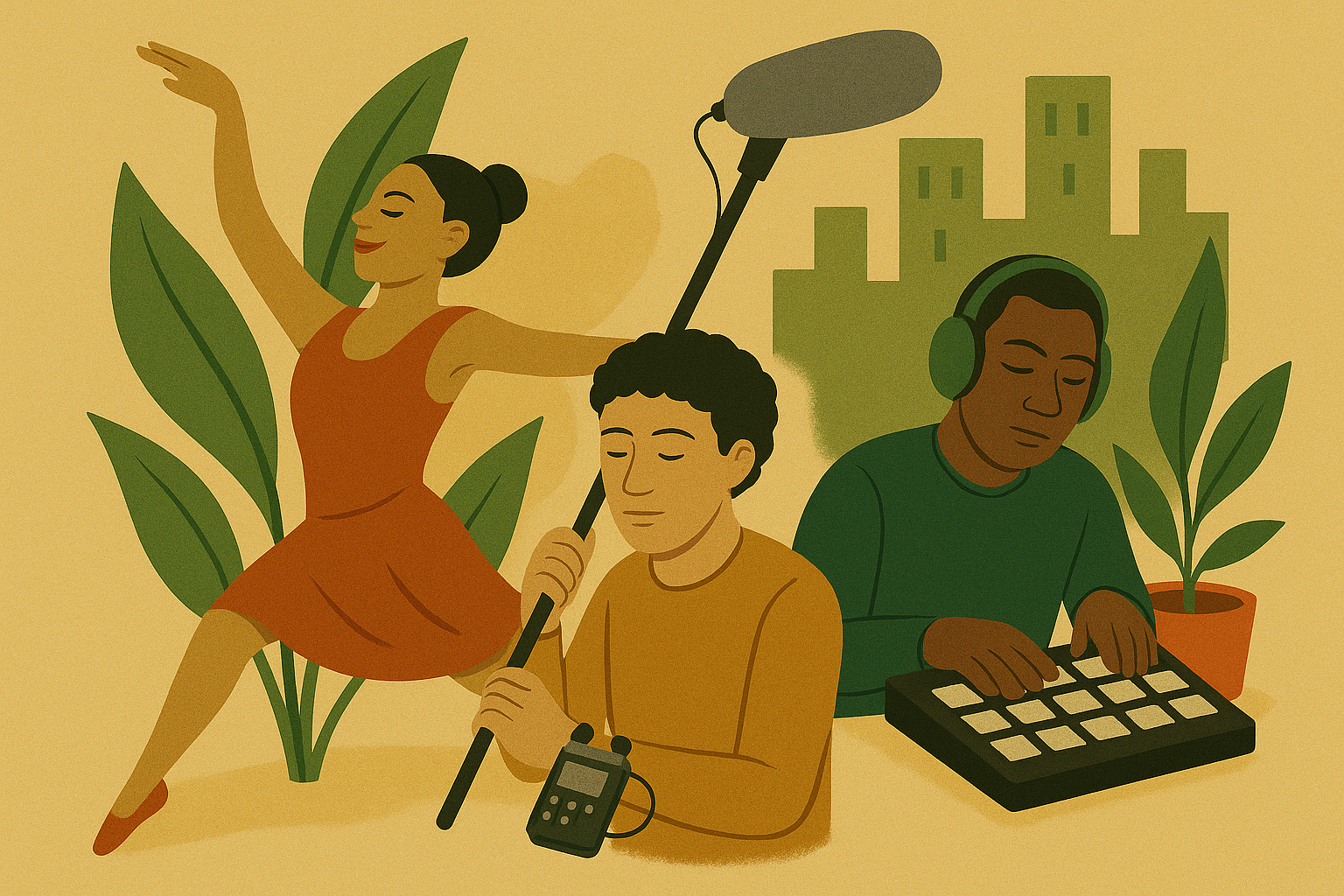Les « banques de sons » des beatmakers sénégalais : provenances, usages et processus de création
DOI:
https://doi.org/10.62410/a29ffp67Keywords:
hip-hop, Sénégal, beatmaking, digital, studiosAbstract
Based on a doctoral dissertation defended at EHESS in March 2023, which examines musical creation in the digital era among Senegalese hip-hop producers (or "beatmakers"), this article highlights the central role of the "sound bank" in creative processes. Drawing on ethnographic data collected in studios, as well as interviews with musicians and cultural actors in Senegal, the objective of this study is to demonstrate that these libraries are not merely the sum of the samples they contain. Their organization reflects classification strategies and criteria (by theme, type, date, or origin). Moreover, the computer desktop, where these sound banks are stored, constitutes a site of knowledge that is also inherently connected, embedded within multiple scales, from the local to the global. The sound banks of beatmakers thus offer insight into how they navigate these dynamics, shedding light on the relationships between samples in terms of their origin and use.
Downloads
References
Demers, Joanna. 2003. « Sampling the 1970s in Hip-Hop ». Popular Music 22 (1) : 41–56.
Goudaillier, Jean-Pierre. 2011. « Contemporary french in low-income neighborhoods : language in the mirror, language of refusal ». Adolescence HS 1 (5) : 183–88. https://doi.org/10.3917/ado.hs01.0183.
Greene, Paul D. 2002. « Nepal’s “Lok Pop” Music: Representations of the Folk, Tropes of Memory, and Studio Technologies ». Asian Music 34 (1) : 43–65.
Hammou, Karim, and Marie Sonnette-Manouguian. 2022. « Chapitre III. Socio-économie de l’“urbain” musical ». Dans 40 ans de musiques hip-hop en France, 85–115. Ministère de la Culture - DEPS. https://doi.org/10.3917/deps.hammo.2022.01.0085.
Hasnain, Zainab. 2017. « How the Roland TR-808 Revolutionized Music ». The Verge. April 3, 2017. https://www.theverge.com/2017/4/3/15162488/roland-tr-808-music-drum-machine-revolutionized-music.
Jacob, Christian. 2014. Qu’est-ce qu’un lieu de savoir? OpenEdition Press. https://doi.org/10.4000/books.oep.423.
McLeod, Kembrew. 2005. Freedom of Expression®: Overzealous Copyright Bozos and Other Enemies of Creativity. New York : Doubleday. http://archive.org/details/freedomofexpress00kemb.
Meintjes, Louise. 2003. Sound of Africa!: Making Music Zulu in a South African Studio. Durham : Duke University Press.
Montas, Arnaud. 2020. Droit(s) et hip-hop. Libre droit. Le Kremlin-Bicêtre : Mare & Martin.
Moulard, Sophie. 2008. « “Senegal Yewuleen!” Analyse Anthropologique Du Rap à Dakar : Liminarité, Contestation et Culture Populaire ». Thèse de doctorat en anthropologie, Bordeaux : Université de Bordeaux 2.
———. 2009. « Le Rap à Dakar. Mise En Perspective Du Local et Du Global Dans Une Culture Populaire Urbaine Au Sénégal ». Dans Comment La Musique Vient Aux Territoires. Sous la direction de Yves Raibaud, 153-63. Bordeaux : MSHA/CNRS.
Niang, Abdoulaye. 2001. « Etude Interdisciplinaire Du Rap à Dakar à Travers Une Approche de La Complexité : Entre Mouvement Social et Groupe Primaire ». Mémoire de maîtrise, Saint Louis (Sénégal) : Université Gaston Berger, UFR de lettres et sciences humaines.
Olivier, Emmanuelle. 2017. « Musical Creation and Recording Studio in Ethnomusicology, a Reflection from Bamako (Mali) ». Communication, Tracking the Creative Process in Music, Huddersfield, septembre 2017.
———. 2022. « Les Localités d’une Technologie Globale, Pratiquer l’ethnomusicologie En Régime Numérique ». Cahiers d’ethnomusicologie 35 : 9–24.
Péneau, Maël. 2022. « L’acquisition des savoirs audionumériques dans les studios des beatmakers Sénégalais ». Cahiers d’ethnomusicologie 35 : 105–21.
———. 2023a. « Le Beatmaking à Dakar : Savoirs, Pratiques et Cultures Du Numérique ». Thèse de doctorat, Paris : Centre Georg Simmel, École des Hautes Études en Sciences Sociales.
———. 2023b. « Le synthétiseur Yamaha DX7 dans la musique sénégalaise ». Volume ! La revue des musiques populaires 20 (1) : 131–42. https://doi.org/10.4000/volume.11688.
Poschardt, Ulf. 2002. DJ culture. Paris : Kargo/L’Éclat.
Pras, Amandine, Kierian Turner, Toby Bol, and Emmanuelle Olivier. 2019. « Production Processes of Pop Music Arrangers in Bamako, Mali ». Journal of the Audio Engineering Society. https://www.aes.org/e-lib/browse.cfm?elib=20669.
Puig, Nicolas. 2017. « “Composer avec” : Sampling et références sonores dans le travail d’un artiste palestinien au Liban ». Volume ! La revue des musiques populaires 14 (1) : 37–49. https://doi.org/10.4000/volume.5343.
Récanati, François. 1979. « Le Développement de La Pragmatique ». Langue Française (42) : 6–20.
Senghor, Fatou Kandé. 2015. Wala Bok : Une histoire orale du hip hop au Sénégal. Dakar : Éditions Amalion.
Shipley, Jesse Weaver. 2017. « Parody after Identity: Digital Music and the Politics of Uncertainty in West Africa ». American Ethnologist 44 (2) : 249–62. https://doi.org/10.1111/amet.12476.
Downloads
Published
Issue
Section
Categories
License
Copyright (c) 2025 Maël Péneau

This work is licensed under a Creative Commons Attribution 4.0 International License.
